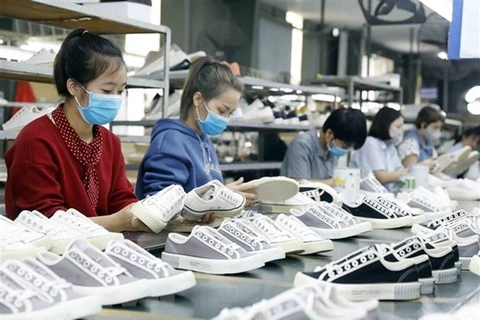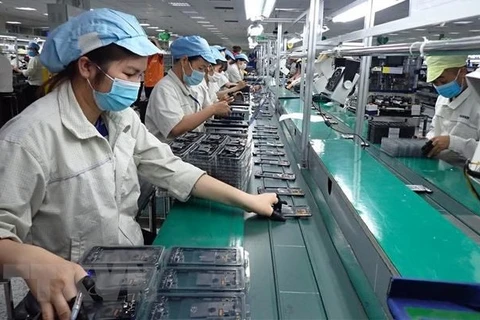Hanoi (VNS/VNA) - Investment, export and domestic consumption are defined as three main pillars of the country's economic development in 2022, according to economist Vu Vinh Phu.
Phu told online paper laodongthudo that Vietnam needed a great amount of investment for its development, adding that effectively attracting domestic and foreign investment capital would lead to the launch of new production factories and agricultural farms and the development of new roads, airports and ports. That would not only help create new jobs for local people but also foster the country's economic growth.
However, Phu said Vietnam could not attract investment at any cost. It was necessary for the country to seek investment selectively, including projects on developing factories and farms that would apply 4.0 technology in production towards a green and circular economy and churn out products that could compete well in both domestic and international markets.
Phu also explained why he outlined export as the second pillar of economic growth this year. He said that despite many difficulties caused by the prolonged COVID-19 pandemic, Vietnam remained one of the countries with large export turnover in the region and world. Last year, Vietnam's trade value topped 668 billion USD with exports accounting for 336 billion USD, up 19 percent year-on-year.
But, in order to increase its export turnover, Vietnam should overcome many shortcomings such as goods being mainly exported in raw and processed form, dependence on imported raw materials, high production and export costs, and unstable export markets with dependence on one or two importing countries, Phu said.
The lack of official distribution systems in foreign countries led to many Vietnamese-made goods labelled under foreign branding when exported, he added.
He emphasised the importance of reducing imported raw materials, focusing on product creation and design, and reducing the proportion of processing in exports in order to enhance the efficiency of exports.
It was also necessary for Vietnamese exporters to create long-term trust for the importing country, to do business responsibly, seriously and honestly with partners around the world.
In terms of domestic consumption, the third pillar, many countries around the world assessed that the potential of Vietnam's domestic market remained huge. With the final consumption of the entire population accounting for 65-70 percent of GDP growth, the domestic market was attractive to domestic and international investors.
According to Phu, if Vietnam wants to speed up domestic consumption, the country should restructure its trade system so that goods, especially Vietnamese-made ones, could be presented properly in supermarkets, traditional markets and grocery shops.
Regular and effective inspection should be also included to prevent organisations and individuals from smuggling, committing commercial fraud and manufacturers importing counterfeit goods that might hurt customers and domestic producers.
Vietnam’s gross domestic product in 2021 expanded by 2.58 percent over the previous year, despite the adverse impact of the COVID-19 pandemic in all fields, according to the General Statistics Office (GSO).
"This is a great achievement for Vietnam, especially as in the third quarter of 2021 many key economic localities had to implement prolonged social distancing to prevent the pandemic spreading," said GSO General Director of Nguyen Thi Huong.
Huong said that GDP in the fourth quarter rose 5.22 percent over the same period last year. This figure was higher than the growth rate of 4.61 percent seen in the fourth quarter of 2020, but lower than the average fourth-quarter growth rates in 2011-19.
Final consumption rose by 2.09 percent against 2020, while accumulated assets increased by 3.96 percent./.
Phu told online paper laodongthudo that Vietnam needed a great amount of investment for its development, adding that effectively attracting domestic and foreign investment capital would lead to the launch of new production factories and agricultural farms and the development of new roads, airports and ports. That would not only help create new jobs for local people but also foster the country's economic growth.
However, Phu said Vietnam could not attract investment at any cost. It was necessary for the country to seek investment selectively, including projects on developing factories and farms that would apply 4.0 technology in production towards a green and circular economy and churn out products that could compete well in both domestic and international markets.
Phu also explained why he outlined export as the second pillar of economic growth this year. He said that despite many difficulties caused by the prolonged COVID-19 pandemic, Vietnam remained one of the countries with large export turnover in the region and world. Last year, Vietnam's trade value topped 668 billion USD with exports accounting for 336 billion USD, up 19 percent year-on-year.
But, in order to increase its export turnover, Vietnam should overcome many shortcomings such as goods being mainly exported in raw and processed form, dependence on imported raw materials, high production and export costs, and unstable export markets with dependence on one or two importing countries, Phu said.
The lack of official distribution systems in foreign countries led to many Vietnamese-made goods labelled under foreign branding when exported, he added.
He emphasised the importance of reducing imported raw materials, focusing on product creation and design, and reducing the proportion of processing in exports in order to enhance the efficiency of exports.
It was also necessary for Vietnamese exporters to create long-term trust for the importing country, to do business responsibly, seriously and honestly with partners around the world.
In terms of domestic consumption, the third pillar, many countries around the world assessed that the potential of Vietnam's domestic market remained huge. With the final consumption of the entire population accounting for 65-70 percent of GDP growth, the domestic market was attractive to domestic and international investors.
According to Phu, if Vietnam wants to speed up domestic consumption, the country should restructure its trade system so that goods, especially Vietnamese-made ones, could be presented properly in supermarkets, traditional markets and grocery shops.
Regular and effective inspection should be also included to prevent organisations and individuals from smuggling, committing commercial fraud and manufacturers importing counterfeit goods that might hurt customers and domestic producers.
Vietnam’s gross domestic product in 2021 expanded by 2.58 percent over the previous year, despite the adverse impact of the COVID-19 pandemic in all fields, according to the General Statistics Office (GSO).
"This is a great achievement for Vietnam, especially as in the third quarter of 2021 many key economic localities had to implement prolonged social distancing to prevent the pandemic spreading," said GSO General Director of Nguyen Thi Huong.
Huong said that GDP in the fourth quarter rose 5.22 percent over the same period last year. This figure was higher than the growth rate of 4.61 percent seen in the fourth quarter of 2020, but lower than the average fourth-quarter growth rates in 2011-19.
Final consumption rose by 2.09 percent against 2020, while accumulated assets increased by 3.96 percent./.
VNA
























